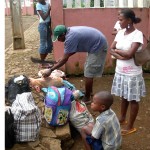The time is right for concerted international action on domestic resource mobilisation in the developing world. Recent high [...]]]>
The time is right for concerted international action on domestic resource mobilisation in the developing world. Recent high performance on collecting taxes and other domestic resources in developing countries shows that if properly harnessed and managed, domestic revenue can be a very important and sustainable source of long-term finance for economic development and reducing poverty.

Foreign Minister Ngozi Okonjo-Iweala of Nigeria Addresses the UN General Assembly. Credit: UN Photo/Devra Berkowitz
Increasing income from domestic resources makes countries less dependent on aid, which can be highly unpredictable. Recently, aid volatility has been exacerbated by frequent fiscal challenges faced by many donor countries. More domestic financial flows would also make low and middle income countries less exposed to donor conditionality, allowing them to choose their own development priorities to meet their citizens’ needs. What’s more, mobilising domestic resources demands good governance and prudent resource management in order to meet taxpayers’ aspirations. In other words, if governments want people to appreciate the need to pay taxes, they must use the extra revenue on high-impact and result-oriented interventions to significantly reduce poverty, inequality, and unemployment and meet other social needs.
According to a recent African Development Bank report, tax revenue collection has improved in many African countries since the 1990s. Overall tax receipts in Africa increased from about 22 percent of GDP in 1990, to about 27 percent of GDP in 2007. However there was some variation across countries.
Tax revenue in low-income African countries was still below 15 percent of GDP – the conventional IMF threshold for satisfactory tax performance, and a level deemed by the United Nations to be insufficient to achieving the Millennium Development Goals.
Some problems in developing countries are illicit financial outflows, mostly due to looting by corrupt leaders and government officials, tax base erosion and profit shifting by multinationals, multiple tax incentives, informal activities not being included in the revenue base, and illicit domestic flows.
Embezzlement of public funds by corrupt officials has become disturbingly pervasive, especially in mineral resource-rich countries in Africa. Also, over-dependence on aid or on abnormal profits from natural resources can make governments oblivious to their potential to raise revenue from other sources. All involved in the Global Partnership for Development should coordinate their efforts to resolve these problems.
Effective development co-operation can boost countries’ own revenue-raising efforts by scaling up donor assistance, as well as sharing knowledge and expertise. It can help develop existing country revenue collection institutions, support reforms and improve accountability mechanisms. It should also help to track progress on institutional and capacity developments using country frameworks.
More expertise is needed for tax officials in developing countries conducting tax policy analyses and designing tax policies appropriate to local country conditions. Investing development aid in building tax systems can yield impressive returns, but only limited funds have been targeted toward this sector so far.
With donor support, developing countries’ governments can invest more in building their own technical capacities, in researching international best practices and in improving their negotiation skills to help them receive maximum benefit from new natural resource contracts. Above all, development frameworks for increasing domestic resource mobilisation should be home-driven and tailored to each country’s specific needs and circumstances, in line with the Busan Partnership Agreement’s first principle of country ownership.
Domestic resource mobilisation is one of the Global Partnership for Effective Development Co-operation’s top priorities for action at its first High-level meeting, to be held in Mexico City in April 2014. As we prepare, I call on all Global Partnership stakeholders including development co-operation providers and recipients, civil society, parliamentarians, and private businesses, to reflect on these issues. With their input, we can have fruitful dialogue to determine how the challenges of domestic resource mobilisation can be properly integrated to the post-2015 development agenda.
It is also imperative that the meeting addresses development co-operation providers’ accountability for timely delivery on their commitments to support these efforts. I believe strongly that the Mexico meeting can better position development co-operation to address the challenges of domestic resource mobilisation in low and middle income countries.
This article was originally featured on the Effective Development Co-operation Blog hosted by the Global Partnership for Effective Development Co-operation to foster constructive comment to help nations, business and organisations work better together to end poverty.
]]>At the coffee plantation Monte Café, to the left of its dilapidated pink colonial buildings, stands a huge shed. The caretaker unlocks a gigantic padlock and we step into a surreal [...]]]>

Ghost factory. By M. Sayagues
At the coffee plantation Monte Café, to the left of its dilapidated pink colonial buildings, stands a huge shed. The caretaker unlocks a gigantic padlock and we step into a surreal décor for a tropical Blade Runner movie.
The shed houses a web of pipes and drums, coffee-processing machinery made by the Brazilian company Pinhalense. It is huge, complex – and never used.
The caretaker remembers when the machines were put in place, about a decade ago, but he never saw them working.
Donors pulled the plug on this US$24 million project after US$14 were spent and a few siphoned off.
The project was sponsored by ESAGRI, the agricultural arm of the Portuguese group Espirito Santo, with US$10.9 from the African Development Bank, totalling US$13 in foreign aid.
I went with a coffee grower who groaned at all the inappropriate elements: for example, a wasteful layout and excessive drying capacity for the production of the 1,800-hectares plantation. The optical scanner for bean selection made him laugh: it required a dust-free, air-conditioned environment, not the dust, humidity and power cuts of Sao Tome.
Going back to the capital after 4 pm, there were no taxis so I start walking. A man in a 4×4 offers me a ride. He is a businessman in his fifties and he insists on showing me his failed textile factory.
In the 1980s, it produced trousers and shirts for both the local market and for Angola, following an agreement between the two allied Marxist governments. When Angola liberalized its economy in the late 1990s, the contract was cancelled and the factory closed.
“Naively, we thought the contract would go on forever and did not look for other markets,” he explained.
Another padlock, another eerily silent space, a 2,000 sq.metres building with rows of old sewing machines.
Two ghost factories: one, the failure of a donor-funded development project. The other, a failure of the post-colonial regime’s industrialisation drive.
Provocative analysis

Improductive from Day One. By M. Sayagues
Africa is littered with abandoned industrial parks and two new, thought-provoking books explain why.
In Dead Aid, Zambian economist Dambisa Moyo argues that foreign aid to Africa has discouraged free enterprise while fuelling corruption and rent-seeking, defined as the use of governmental authority to make and take money without trade or production of wealth.
Aid, she says, lowers the incentive for investment and chokes off growth.
Because aid flows are seen as permanent income, policymakers have no incentive to look for other ways of financing development. Worse, they have no sense of urgency “in remedying Africa’s critical woes.”
In Architects of Poverty, South African author Moeletsi Mbeki argues that African elites obstruct the development of an indigenous entrepreneurial class, seen as a threat to their power. (Read an interview here).
Instead, elites entrench themselves as a “parasitic bureaucratic bourgeoisie…unproductive but wealthy black crony capitalists” who live off state revenues, ignore or exploit peasants, and divert profits to elite consumption or capital flight.
Mbeki notes that one of the biggest scandals is the underinvestment in transport in Africa.
Long wait
The 70 kms drive from Sao Tome to Porto Alegre on the south of the island takes 5 hours and a sturdy car to negotiate potholes.
Few minibuses ply this route because drivers don’t want to destroy their cars. So the trip from Porto Alegre to the capital turns into a day-long journey. That hurts tourism, trade and travel.
Since 7 am, Alice Tavares waited for a bus with her 2 young children and a neighbour’s teenager. They carried school satchels, two baskets of fish, five bundles of clothes and two jerry cans of petrol.

Patient Alice buys a pig. M. Sayagues
The early minibus was full. The second arrived at noon and went half-way to Angolares, where we waited for three hours. Alice bought a freshly butchered pig and stuffed it in a plastic bag. I took photos. We got to the capital after sunset.
How hard can it be to maintain a total of 320 kms of roads in the tiny islands? Since 2007, small billboards brag about a European Union aid project to improve roads. What a joke. Looks more like dead aid managed by the architects of poverty.
]]>